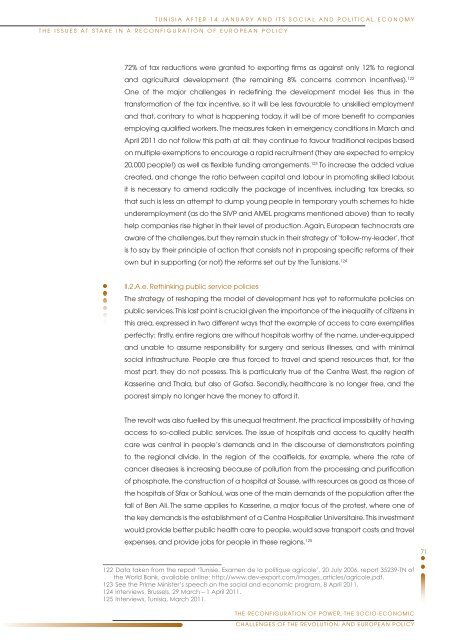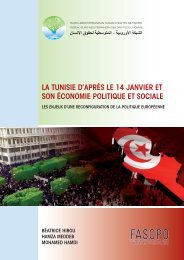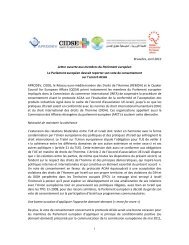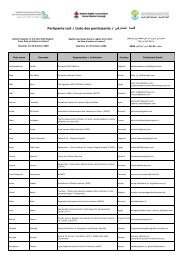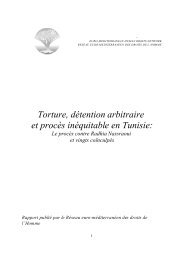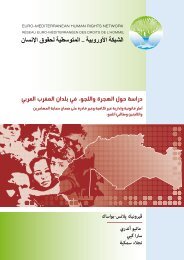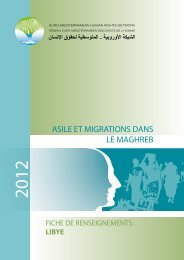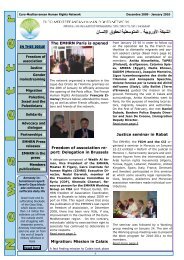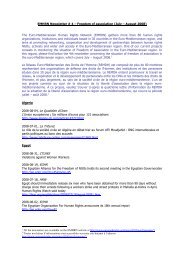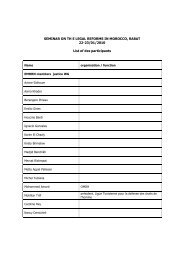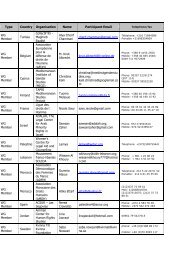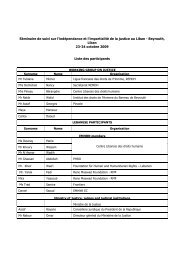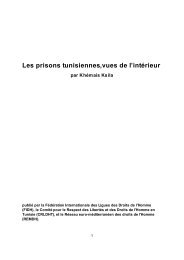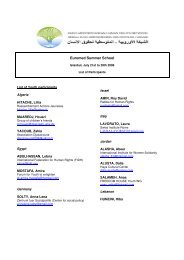tunisia after 14 january and its social and political economy - Refworld
tunisia after 14 january and its social and political economy - Refworld
tunisia after 14 january and its social and political economy - Refworld
Create successful ePaper yourself
Turn your PDF publications into a flip-book with our unique Google optimized e-Paper software.
T U N I S I A A F T E R 1 4 J A N U A R Y A N D I T S S O C I A L A N D P O L I T I C A L E C O N O M YT H E I S S U E S A T S T A K E I N A R E C O N F I G U R A T I O N O F E U R O P E A N P O L I C Y72% of tax reductions were granted to exporting firms as against only 12% to regional<strong>and</strong> agricultural development (the remaining 8% concerns common incentives). 122One of the major challenges in redefining the development model lies thus in thetransformation of the tax incentive, so it will be less favourable to unskilled employment<strong>and</strong> that, contrary to what is happening today, it will be of more benefit to companiesemploying qualified workers. The measures taken in emergency conditions in March <strong>and</strong>April 2011 do not follow this path at all: they continue to favour traditional recipes basedon multiple exemptions to encourage a rapid recruitment (they are expected to employ20,000 people!) as well as flexible funding arrangements. 123 To increase the added valuecreated, <strong>and</strong> change the ratio between capital <strong>and</strong> labour in promoting skilled labour,it is necessary to amend radically the package of incentives, including tax breaks, sothat such is less an attempt to dump young people in temporary youth schemes to hideunderemployment (as do the SIVP <strong>and</strong> AMEL programs mentioned above) than to reallyhelp companies rise higher in their level of production. Again, European technocrats areaware of the challenges, but they remain stuck in their strategy of ‘follow-my-leader’, thatis to say by their principle of action that consists not in proposing specific reforms of theirown but in supporting (or not) the reforms set out by the Tunisians. 124II.2.A.e. Rethinking public service policiesThe strategy of reshaping the model of development has yet to reformulate policies onpublic services. This last point is crucial given the importance of the inequality of citizens inthis area, expressed in two different ways that the example of access to care exemplifiesperfectly: firstly, entire regions are without hospitals worthy of the name, under-equipped<strong>and</strong> unable to assume responsibility for surgery <strong>and</strong> serious illnesses, <strong>and</strong> with minimal<strong>social</strong> infrastructure. People are thus forced to travel <strong>and</strong> spend resources that, for themost part, they do not possess. This is particularly true of the Centre West, the region ofKasserine <strong>and</strong> Thala, but also of Gafsa. Secondly, healthcare is no longer free, <strong>and</strong> thepoorest simply no longer have the money to afford it.The revolt was also fuelled by this unequal treatment, the practical impossibility of havingaccess to so-called public services. The issue of hospitals <strong>and</strong> access to quality healthcare was central in people’s dem<strong>and</strong>s <strong>and</strong> in the discourse of demonstrators pointingto the regional divide. In the region of the coalfields, for example, where the rate ofcancer diseases is increasing because of pollution from the processing <strong>and</strong> purificationof phosphate, the construction of a hospital at Sousse, with resources as good as those ofthe hospitals of Sfax or Sahloul, was one of the main dem<strong>and</strong>s of the population <strong>after</strong> thefall of Ben Ali. The same applies to Kasserine, a major focus of the protest, where one ofthe key dem<strong>and</strong>s is the establishment of a Centre Hospitalier Universitaire. This investmentwould provide better public health care to people, would save transport costs <strong>and</strong> travelexpenses, <strong>and</strong> provide jobs for people in these regions. 12571122 Data taken from the report ‘Tunisie. Examen de la politique agricole’, 20 July 2006, report 35239-TN ofthe World Bank, available online: http://www.dev-export.com/images_articles/agricole.pdf.123 See the Prime Minister’s speech on the <strong>social</strong> <strong>and</strong> economic program, 8 April 2011.124 Interviews, Brussels, 29 March – 1 April 2011.125 Interviews, Tunisia, March 2011.The reconfiguration of power, the socio-economicchallenges of the revolution, <strong>and</strong> European policy


